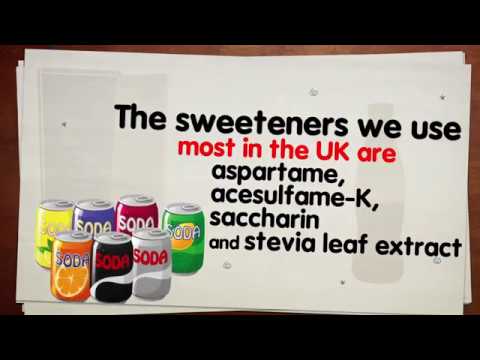Aspartame and sweeteners

Learn how to separate fact from fiction with our no-nonsense guide to aspartame and sweeteners.
In Great Britain and Ireland, aspartame is one of our most commonly used sweeteners. It’s made from the same building blocks of protein found in everyday foods, like meat, fish and eggs, and is used by food and drink manufacturers in a range of products, including yoghurts, chewing gum and soft drinks.
It’s around 200 times sweeter than sugar, so we use it in very small amounts, but it’s calorie-free. Which enables you to enjoy your favourite Coca‑Cola drinks with less or no sugar, and fewer or no calories.
Here’s everything you need to know about our use of sweeteners in under 50 seconds:
But is it safe? What does really zero calorie actually mean? We're sure you still have questions.
Worry not – we’ve got them covered…
Fact or fiction: Drinks with aspartame low calorie sweeteners are unsafe
Fiction. Sweeteners such as aspartame are tightly regulated and can only be used once their safety has been rigorously assessed.
With over 200 studies to support its safety, aspartame is one of the most thoroughly tested ingredients in the world. Its safety has been validated time and time again, including by the European Food Safety Authority (EFSA) in 2013.
Did you know? The acceptable daily intake (ADI) for aspartame is 40mg per kilo of body weight.
Fact or fiction: Drinks with aspartame won’t make you put on weight
Fact. Adding low and no calorie sweeteners like aspartame to food and drinks gives them a sweet taste, often without the calories.
In fact, if used consistently as part of a balanced diet and combined with regular exercise, food and drinks containing aspartame can actually help you manage your weight.
Fact or fiction: Pregnant women cannot consume drinks sweetened with aspartame
Fiction. Aspartame is safe for pregnant and breastfeeding women. If you are pregnant, however, you should always follow your doctor’s advice.
Fact or fiction: Sparkling soft drinks sweetened with aspartame are safe to drink if you have diabetes
Fact. Low and no calorie sweeteners like aspartame won’t affect your blood glucose, so are safe to consume if you have diabetes. And because aspartame still provides sweetness without the calories, it can help everyone – including diabetics – manage their calorie intake to enjoy more food and drink choices.
Did you know? Almost all Coca‑Cola brands have a lower sugar or no-sugar alternative.
Fact or fiction: Your appetite will be increased by drinking soft drinks containing aspartame
Fiction: Studies show low-calorie sweeteners like aspartame don’t cause people to eat more, so they can be a useful tool to help reduce your overall calorie intake.
Fact or fiction: Drinking diet drinks containing aspartame can lead to tooth decay
Fiction. Sweeteners like aspartame do not promote tooth decay. Bacteria that are naturally present in your mouth turn carbohydrates to acid, causing tooth decay. Aspartame is tooth-friendly because it’s made from parts of protein, rather than carbohydrates.
You can find out more about aspartame via Diabetes IE.
Stevia 101
Aspartame is just one of the sweeteners we use to provide great tasting drinks with less or no sugar. Stevia is another, which is a completely natural plant extract. Like aspartame, it provides oodles more sweetness per spoonful than sugar, and is completely calorie-free. Here are the basics:
Got more questions? Take a look at our take on the sugar tax.


